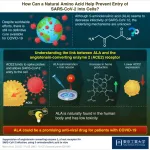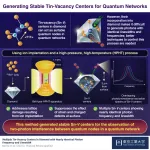(Press-News.org) UVA Health scientists have discovered an unknown contributor to harmful blood vessel growth in the eye that could lead to new treatments for blinding macular degeneration and other common causes of vision loss.
UVA’s Jayakrishna Ambati, MD, and Shao-bin Wang, PhD, and their colleagues have identified a new target to prevent the formation of abnormal tangles of blood vessels associated with eye conditions such as neovascular age-related macular degeneration, proliferative diabetic retinopathy and ischemic retinal vein occlusion.
“Our study has opened up the possibility of mitigating aberrant blood vessel growth in eye diseases by targeting the epigenetic machinery,” said Ambati, the founding director of UVA’s Center for Advanced Vision Science and a member of the University of Virginia School of Medicine’s Department of Ophthalmology. “Through local targeting of the epigenetic regulator, we have gained a deeper understanding of how ocular immune cells can cause a loss of control over blood vessel growth under the retina. This approach also offers a new direction for the development of more effective, cost-efficient and accessible interventions, thereby avoiding issues such as drug resistance, which is a growing concern with conventional anti-VEGF therapies used in clinical treatments.”
Understanding Vision Loss
Scientists have known that abnormal vessel overgrowth in the eye is fueled by excessive amounts of a substance called “vascular endothelial growth factor-A,” or VEGF, that plays an important role in blood vessel formation. There are now treatments available that target VEGF to prevent vessel overgrowth, and they often provide dramatic benefits at first. Unfortunately, these benefits can fade with time. That leaves doctors in need of better treatments to help preserve patients’ eyesight.
Ambati and Wang’s new research identifies a key protein that determines VEGF levels. Blocking this protein in lab mice reduced their VEGF levels significantly, and it did so in a targeted way, without unwanted side effects. The scientists noted, for example, that they observed no toxic effects on the retina, the light-sensing portion of the eye where the vessel overgrowth occurs. “This fat mass and obesity-associated (FTO) protein was previously shown to be correlated with obesity in humans. Unexpectedly, we found it also play important roles in regulating ocular neovascularization through an epigenetic mechanism,” Ambati said. “This exciting discovery finally answers a longstanding question about how ocular immune cells, such as macrophages, contribute to abnormal blood vessel growth under the retina. This question was first investigated by our team 20 years ago, and we're thrilled to have found an answer.”
In addition to identifying a promising target for the development of new treatments for vision loss, the discovery sheds important light on the fundamental mechanisms responsible for the blood vessel overgrowth that robs millions of people of their sight. Neurovascular age-related macular degeneration alone affects more than 200 million people worldwide. While much more research and testing will be needed before the new finding could be translated into a treatment, the UVA scientists are excited about the potential of the discovery.
“Current strategies for treating ocular neovascular disorders, which primarily focus on regulating the protein levels of VEGF, are not perfect. Therefore, it is imperative to identify more targetable candidates to develop alternative therapies,” Wang said. “We are hopeful that our study will pave the way for the development of new treatments, ultimately reducing the burden of neovascular-related illnesses.”
Findings Published
The researchers have published their findings in the scientific journal Signal Transduction & Targeted Therapy. The research team consisted of Shao-bin Wang, Yosuke Nagasaka, Dionne Argyle, Ayami Nagasaka, Praveen Yerramothu, Bradley D. Gelfand and Ambati. Ambati is a co-founder of DiceRx, iVeena Holdings, iVeena Delivery Systems and Inflammasome Therapeutics and has done consulting work unrelated to the research. A full list of the authors’ disclosures is included in the paper.
The research was supported by the National Institutes of Health, grants R01EY028027, R01EY029799, R01EY031039 and R01AG082108; the UVA Strategic Investment Fund; the DuPont Guerry III professorship; a gift from Mr. and Mrs. Eli W. Tullis; the Annette Lightner Fund; BrightFocus Foundation Award M2020114; and the Owens Family Foundation.
To keep up with the latest medical research news from UVA, subscribe to the Making of Medicine blog at http://makingofmedicine.virginia.edu.
END
Discovery suggests new way to prevent common causes of vision loss
2023-02-24
ELSE PRESS RELEASES FROM THIS DATE:
Could a naturally occurring amino acid lead us to a cure for COVID-19?
2023-02-24
After more than two years since its discovery, six million deaths, and half a billion reported cases, there is still no effective cure for COVID-19. Even though vaccines have lowered the impact of outbreaks, patients that contract the disease can only receive supportive care while they wait for their own body to clear the infection.
A promising COVID-19 treatment strategy that has been gaining traction lately is targeting angiotensin-converting enzyme 2 (ACE2). This is a receptor found on the cell membrane that allows entry of the virus into the cell due to its ...
Breakthrough in tin-vacancy centers for quantum network applications
2023-02-24
Quantum entanglement refers to a phenomenon in quantum mechanics in which two or more particles become linked such that the state of each particle cannot be described independently of the others, even when they are separated by a large distance. The principle, referred to by Albert Einstein as "spooky action at a distance", is now utilized in quantum networks to transfer information. The building blocks of these networks—quantum nodes—can generate and measure quantum states.
Among the candidates that can function as ...
Low income, race, and rural residence among risk factors for low telemedicine literacy
2023-02-24
February 24, 2023 – Demographic factors including low income and living in a rural area are linked to low telemedicine literacy – which may limit access to plastic surgeons and other healthcare providers at a time of expanding use of telehealth and video visits, according to a report in the March issue of Plastic and Reconstructive Surgery®, the official medical journal of the American Society of Plastic Surgeons (ASPS). The journal is published in the Lippincott portfolio by Wolters Kluwer.
"Our ...
Risk of cancer remains high for women over 50 with genetic BRCA1 or BRCA2 mutation
2023-02-24
Although genetic mutations in BRCA1 or BRCA2 are associated with a younger onset of breast and ovarian cancer, women with these genetic mutations continue to face a high risk of cancer incidence after age 50, even if they have not been previously diagnosed with cancer. This is according to a new study led by Kelly Metcalfe, a professor at the Lawrence S. Bloomberg Faculty of Nursing.
The study published recently in the American Cancer Society Journal Cancer, followed over 2000 women between the ages of 50 to 75, from 16 countries, who were aware they had a BRCA mutation ...
Cleft lip and palate surgery procedures are undervalued, study suggests
2023-02-24
February 24, 2023 – Plastic surgery procedures performed to correct cleft lip and palate deformities in infants and children are economically undervalued, relative to pediatric craniofacial procedures, concludes an analysis in the March issue of Plastic and Reconstructive Surgery®, the official medical journal of the American Society of Plastic Surgeons (ASPS). The journal is published in the Lippincott portfolio by Wolters Kluwer.
The study finds unbalanced allocation of relative value units (RVUs) used in billing and compensation for cleft surgery in children, compared to craniofacial procedures, report Roberto L. Flores, MD, of Hansjörg ...
Insomnia tied to greater risk of heart attack, especially in women
2023-02-24
People who suffer from insomnia were 69% more likely to have a heart attack compared to those who didn’t have the sleep disorder during an average nine years of follow-up, according to new research being presented at the American College of Cardiology’s Annual Scientific Session Together With the World Congress of Cardiology. In addition, when looking at sleep duration as an objective measure of insomnia, researchers found that people who clocked five or fewer hours of sleep a night had the greatest risk of experiencing a heart attack. People with ...
Health, not age, driving a rise in pregnancy complications
2023-02-24
Rising rates of adverse pregnancy outcomes, such as hypertensive disorders of pregnancy, preterm birth and low birthweight, over the past 10 years are largely attributable to the health status of a person before they get pregnant, rather than age, according to a study presented at the American College of Cardiology’s Annual Scientific Session Together With the World Congress of Cardiology.
The study found that the average age of pregnant individuals rose from 27.9 years in 2011 to 29.1 years in 2019, yet age accounted for only a small portion of the marked increase ...
Technology-assisted pregnancies have twice the risk of preeclampsia
2023-02-24
People who became pregnant using assisted reproductive technologies were found to be over twice as likely to develop preeclampsia than those with traditional pregnancies, according to a study presented at the American College of Cardiology’s Annual Scientific Session Together With the World Congress of Cardiology.
The study, based on an analysis of health records from over 2.2 million patients, is the first to assess how reproductive technologies may affect the risk of cardiovascular complications during pregnancy on a national scale. Preeclampsia is a pregnancy-related complication involving new onset high ...
Frequent marijuana use linked to heart disease
2023-02-24
People who used marijuana daily were found to be about one-third more likely to develop coronary artery disease (CAD) compared with people who have never used the drug, according to a study presented at the American College of Cardiology’s Annual Scientific Session Together With the World Congress of Cardiology.
As cannabis becomes legal in an increasing number of U.S. states, this study is among the largest and most comprehensive to date to examine the potential long-term cardiovascular implications of using the drug. CAD is the most common form of heart disease and occurs when the arteries that supply blood to the heart ...
Cognitive behavioral therapy delivered via smartphone app lowers blood sugar, improves health behaviors in patients with diabetes
2023-02-24
People with Type 2 diabetes who were given a smartphone app that delivers personalized cognitive behavioral therapy (CBT) saw significantly greater reductions in their blood sugar and less need for higher doses of diabetes medications at six months compared with those who only received standard diabetes care and a control app, in a study presented at the American College of Cardiology’s Annual Scientific Session Together With the World Congress of Cardiology. A clear “dose effect” was seen, with patients completing more CBT lessons seeing the greatest benefits.
“When studied in a large randomized controlled ...





